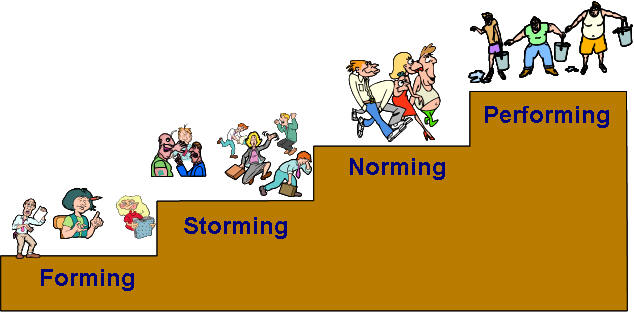Stages of Team Development
Self-Directed Work Teams develop in four stages: Forming, Storming, Norming, and Performing.
It is management's task to provide training, coaching, and an environment that promotes
progression through these stages.
Forming
This
beginning stage lasts a few days or weeks. People think about their new tasks and new
environment. Members plan their work and their new roles. Emotions are positive. The work team
should also learn about team processes in preparation for rough times ahead. They need to learn
the rudiments of conflict resolution, communication, time management, and group decision-making.
Storming
The
anticipation and enthusiasm of the forming stage quickly falls away as the team faces a myriad
of technical, interpersonal and social problems. They fight and argue. People feel frustration,
resentment, and anger as problems fester and work goes undone.
Managers also experience frustration and are tempted to intervene. Members are on an
emotional roller coaster from elation to depression and back again. The situation seems bleak.
With proper training and support, the Storming period may last 1-2 months. Without training and
support, the team may not progress.
Conflict has a bad reputation. But, conflict is normal, natural,
and even necessary. Handled well it builds skill and confidence as the team enters the
Norming Stage.
Norming
Here, the team works through individual and social issues. They establish their own norms of
behavior. Members begin to trust each other.
As
the team develops interpersonal skills, it also hones other skills. Members become increasingly
adept at problem solving. They cross-train and learn new job skills. They manage their time and
their quality with growing competence, confidence, and independence. The Norming stage usually
is 4-12 months.
|
Performing
Now
things begin to click. Members help each other, conflict is de-personalized, problems are solved
and successive goals achieved and exceeded. Satisfaction and pride become the dominant emotions.
The team takes pride in their work, pride in their accomplishments, and pride in their team.
Individuals take pride in their membership.


|





